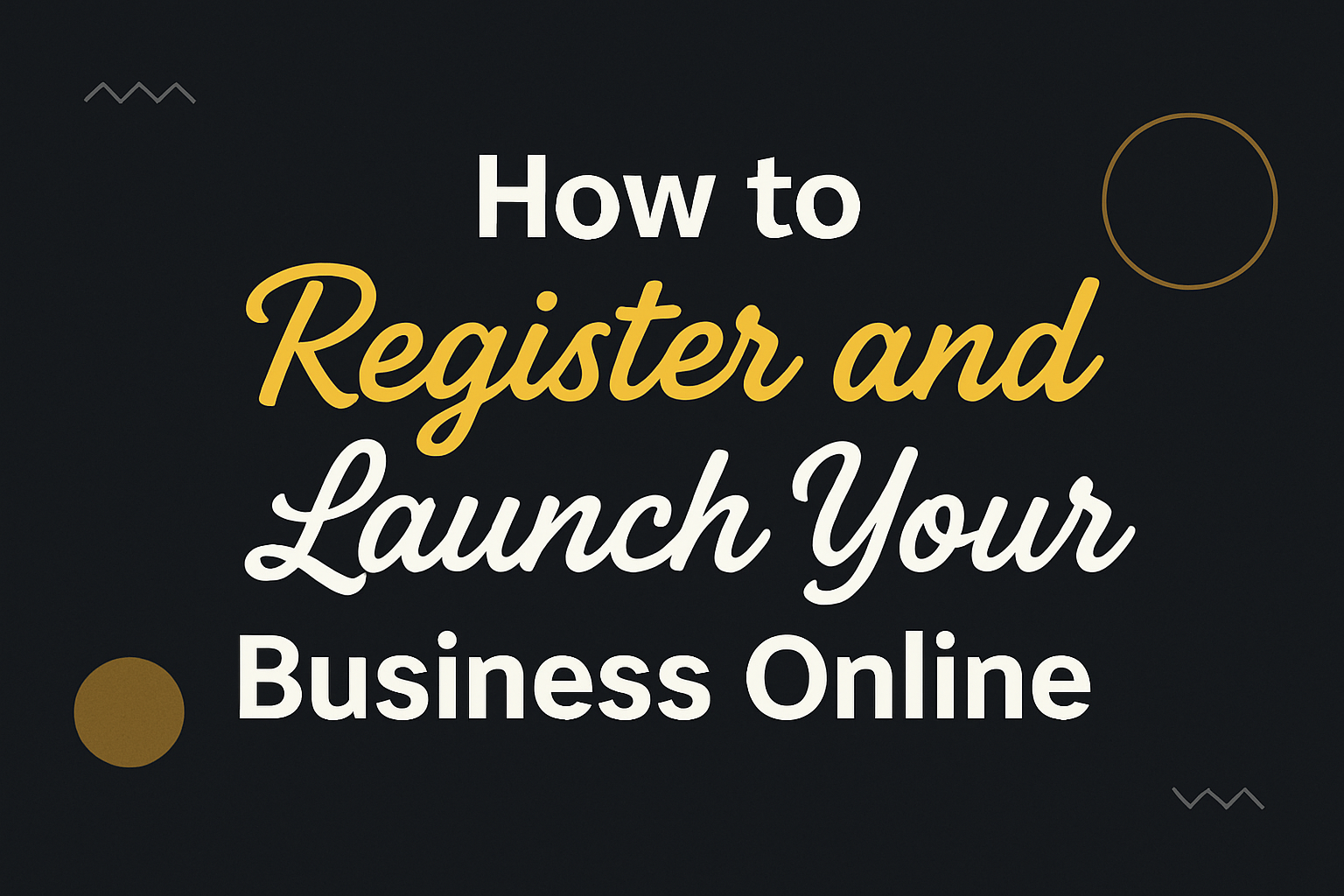Introduction
The internet has made starting a business easier than ever before. In 2025, thousands of entrepreneurs are turning their ideas into profitable ventures online — from e-commerce stores to freelance services and digital agencies. But while it’s simple to begin, launching your business correctly requires planning and structure.
Registering and launching your online business is more than just creating a website. It involves choosing the right name, registering legally, setting up payments, and building an online presence that attracts real customers.
This guide will walk you through each step of launching your business online — ensuring that your foundation is strong, professional, and ready for growth.
Choose the Right Business Name
Your business name is your first impression — it represents your brand, your mission, and your identity. Choosing the right name can make your business more memorable and credible.
A great business name should be simple, relevant, and easy to spell. It should reflect what you do and resonate with your target audience. Before finalizing, brainstorm a list of options and then check their domain availability and trademark status.
Tips for choosing a business name:
-
Keep it short and easy to remember.
-
Avoid numbers or unnecessary characters.
-
Check that your chosen name is available across social media platforms.
-
Make sure the domain name (like .com or .net) is available and affordable.
Once you’ve selected the name, buy your domain immediately to secure it before someone else does.
Register Your Business Legally
Legal registration gives your business credibility and protects you from future complications. Depending on your country or region, registration requirements vary — but the core steps are usually similar.
You’ll need to decide what type of business structure fits your goals: sole proprietorship, partnership, or limited company (LLC). Each has its own benefits in terms of taxes, ownership, and liability.
After selecting your structure, register your business name with the appropriate government department. Also, apply for a tax identification number (TIN) or business registration number, depending on your region.
Don’t skip legal registration — it makes your business legitimate, improves trust with clients, and helps you open business bank accounts.
Build Your Domain and Website
Once your business is legally registered, it’s time to go digital. Your website is your online office — it’s where customers learn about your brand, explore your products or services, and contact you.
You can build a website using platforms like WordPress, Shopify, or Wix, depending on your type of business. For e-commerce, Shopify is ideal. For service-based businesses, WordPress provides more flexibility and customization.
Key elements every professional website should include:
-
Home Page: A clear introduction of what your business offers.
-
About Page: A story that builds trust and connection.
-
Products or Services Page: Detailed listings with descriptions and pricing.
-
Contact Page: Easy ways for customers to reach you.
-
Blog Section: Helps with SEO and keeps your website active.
Make sure your site is mobile-friendly, loads quickly, and uses a secure SSL certificate. A professional website builds confidence and improves search engine ranking.
Set Up Your Business Email and Branding
Professional communication starts with a professional email address. Avoid using free personal emails like Gmail or Yahoo for business purposes. Instead, create one with your domain name — for example, contact@yourbusiness.com.
This small step boosts your credibility and gives your brand a polished image.
Next, work on your brand identity — choose a color palette, design a simple logo (using tools like Canva), and maintain consistent visuals across your website and social media.
Brand consistency ensures customers recognize your business wherever they see it.
Handle Legal Requirements and Policies
Every online business must comply with certain legal standards to operate safely and professionally. Skipping these steps can lead to future problems, especially if you collect customer data or handle online payments.
Essential legal pages and requirements:
-
Privacy Policy: Explains how customer data is collected and protected.
-
Terms & Conditions: Defines the rules and responsibilities of using your website.
-
Return or Refund Policy (for e-commerce): Builds transparency and trust.
-
Cookies Policy: Required if your website uses tracking tools.
You can use free online policy generators to create these pages or consult a lawyer if you want custom terms. A legally compliant website improves user trust and protects you from potential disputes.
Set Up Secure Payment Systems
One of the most critical parts of launching an online business is ensuring smooth, safe, and convenient payment options for your customers.
Depending on your business model, you can use:
-
PayPal, Stripe, or Wise for international transactions.
-
JazzCash or Easypaisa (Pakistan), Paytm (India) for local payments.
-
Bank transfers or cash on delivery if applicable.
Integrate payment gateways directly into your website to make checkout quick and secure. Make sure your payment process is transparent and includes proper receipts or invoices.
Providing multiple payment methods increases customer confidence and reduces cart abandonment.
Create a Marketing Plan
Now that your business is officially registered and your website is live, it’s time to attract your first customers. A strong marketing plan defines how you’ll reach, engage, and convert your target audience.
Start with low-cost, high-impact marketing strategies, such as:
-
Social media promotion
-
SEO content marketing
-
Blogging
-
Email newsletters
-
Paid ads on Facebook or Google
For example:
-
Share behind-the-scenes posts on Instagram to humanize your brand.
-
Post helpful blog articles to attract visitors organically.
-
Offer discounts or freebies to early customers to build word-of-mouth.
Marketing isn’t a one-time task — it’s a continuous process of testing and improving.
Test Before Official Launch
Before announcing your business publicly, test everything to ensure it works perfectly. Visit your own website as a customer would — check for broken links, slow pages, or unclear navigation.
You can even ask friends or colleagues to review your site and give feedback. Make sure that:
-
Your forms and buttons work correctly.
-
Your checkout process is simple.
-
Your content is free of grammatical errors.
Launching without testing can create a poor first impression, so take time to refine every detail.
Promote Your Business Online
Once you’re confident your website is ready, it’s launch time! But simply going live isn’t enough — you need to create buzz around your new business.
Here are two powerful strategies to promote your launch:
-
Social Media Campaigns: Announce your launch on all platforms with eye-catching visuals and a clear call-to-action. Use countdowns or giveaways to build excitement.
-
Email Announcements: Send personalized emails to subscribers or contacts, introducing your brand and offering a launch discount.
You can also collaborate with small influencers or partner brands to spread awareness faster. The more excitement you build around your launch, the quicker your business gains traction.
Monitor and Optimize Performance
After your launch, the real work begins — tracking results and improving continuously.
Use analytics tools like Google Analytics, Facebook Insights, and Google Search Console to monitor traffic, engagement, and sales. Pay attention to what content or campaigns bring the most visitors and conversions.
Keep updating your website with fresh content, new offers, and seasonal promotions. The more active your site, the more Google rewards it with better visibility.
Remember, successful online businesses never stop evolving — they adapt, test, and grow based on data.
Conclusion
Registering and launching your business online may seem like a long process, but each step brings you closer to creating something lasting. By choosing a strong name, registering legally, building a professional website, and setting up marketing systems, you set your business up for long-term success.
The online world is full of opportunities — but only for those who are prepared. Treat your launch like the foundation of a house: build it strong, and it will support everything you create in the future.
Once your business is live, focus on delivering real value, staying consistent, and connecting with your audience. That’s how small online startups grow into trusted, successful brands.


